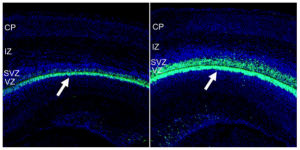Children of mothers whose diet during pregnancy was deficient in the essential nutrient choline have lower performance on cognitive tests. Cognition is rooted in the brain’s cortex, but a direct link between maternal dietary choline levels and cortical development in offspring had not been demonstrated. Experimental evidence of this link, and identification of a physiological mechanism, would greatly enhance our understanding of the importance of proper nutrition during pregnancy. Just-published research from Dr. Zeisel’s laboratory (Wang et al., 2016) shows that a maternal low-choline diet causes severe alterations of cortical growth and development in offspring and provides mechanistic insight into how this happens.
What they did
In this study, Zeisel’s group fed pregnant mice a diet with either normal or low levels of choline from post-fertilization days 11 through 17. Much of the mouse embryonic brain development occurs during this period. Wang et al. found that the offspring of mice fed the low choline diet had smaller brains and reduced thickness of the cortex. They then measured the number of neural progenitor cells in the cortex and found that the count was significantly reduced in offspring of low choline-fed mice (Figure 1). Neural progenitor cells give rise to most of the cells in the cortex, so a relative loss of these cells can have huge consequences for cortical development.

Figure 1. Cross-sectional micrographs of embryonic mouse brains at day 17 showing the layered nature of the brain. Low-choline brains (left) have significantly reduced numbers of progenitor cells (cyan, arrow), and total neuron count (blue) vs. normal-choline brains (right).
The cortex is assembled by layers, and where a particular cell ends up depends on when it was born – the earliest neurons are found in the inner layers whereas later neurons populate the outer layers. Each layer of the cortex has a different function in the brain. Wang et al. found that a maternal low-choline diet resulted in offspring brains that had more cells in the inner (early) layers at the expense of the outer (late) layers. In effect, brain growth and development was stopping earlier than it should. The cells were exiting their developmental program prematurely, producing fewer neurons and giving rise to the observed smaller brains with altered structure. Outer layer neurons are responsible for receiving and processing sensory information, so the observed differences in brain structure could underlie some of the cognitive deficiencies caused by low maternal choline. Importantly, Wang et al. also found that these structural defects persist into adulthood. The next step was to identify how choline deficiency operates. The researchers found that it was the amount of a protein called the epidermal growth factor receptor (EGFR) that was responsible for the effects of cell cycle exiting. EGFR was markedly decreased in low choline animals, and downstream markers of EGFR signaling were also diminished.
Implications
Wang et al. now show that a maternal diet low in choline during critical stages of embryonic brain development results in offspring with decreased brain size, fewer neurons, and altered cortical layering. The origins of these effects appear to be altered cell cycling, where low choline conditions decrease the proliferation of neural progenitor cells and increase early cell cycle exit. A connection between maternal choline intake level and offspring cognitive abilities has been known for several decades, but the physiological mechanisms were not determined. These new findings are important because they show that low maternal choline intake impairs normal growth and development of the cortex, the part of the mammalian brain most responsible for cognition, and because they identify involvement of a specific molecular signaling pathway. The results emphasize the importance of good maternal nutrition on children’s long-term health.
Wang, Y., Surzenko, N., Friday, W.B., & Zeisel, S.H. (in press). Maternal dietary intake of choline regulates development of the cerebral cortex in the offspring. FASEB J.
